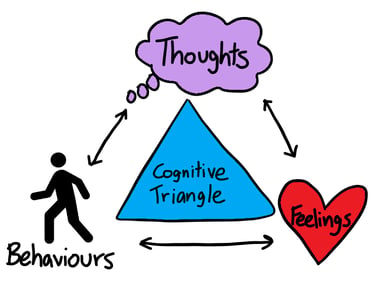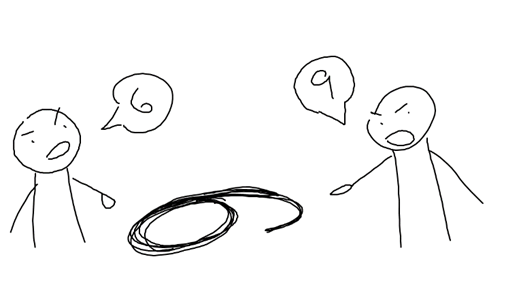
The Power of Perspective
“Change your thoughts and you change your world.” – Norman Vincent Peale
6/11/20233 min read
In my previous article, “Key to Success: The Right Mindset” I explained how mindset is created by thought patterns and that affirmations can help improve positive thinking, but just how important are our thoughts?
“Thoughts become perception; perception becomes reality.” – William James
Let’s breakdown this quote by first understanding what perception is.
The word ‘perception’ is defined by the Cambridge Dictionary as:
“a belief or opinion, often held by many people and based on how things seem”.
From the Cognitive triangle model (below), we can see that thoughts drive our emotions, feelings drive behaviour, and behaviour reinforces thoughts. When you assign truth to a thought, it becomes a belief.
(See “Key to Success: The Right Mindset” for an example on the concept).
Therefore, your thoughts become your perception.
So how does your perception relate to reality? Perception may not always be reality itself, but it is YOUR reality.
Let me give you an example:
You walk outside and it’s a rainy day. You might be really happy about it or upset. Some people might think of it as a miracle to grow their crops and some may think it a curse since they have to cancel their plans. You might be neutral about it and see it as just another day. There are so many ways you might perceive this situation.
Now take a look at this image:
There are two different perspectives. Like many situations you may come across in life, there are different ways you can see things. Scientifically, perception is the interpretation of sensory information. In this image, one person sees the number six from where they are standing, whereas the other sees nine. If either of them moves to the other side, they would see something different.
But… instead they’re arguing about it.
Have you ever been in an argument with a friend and they mention something that actually makes sense and changes your mind? (You might be stubborn like me and keep arguing, but that’s besides the point). Or you might have done debate and the other team argues a point that you haven’t considered. The point is you can’t see from all perspectives if you’re only focused on one.
Now you might be thinking, “So what if I’m upset about a rainy day? I have a right to be!”
Of course, you have the right to feel any sort of way. It’s up to you. But you might find that the little things matter. What happens if you get upset at every minor inconvenience in your life? What if you are constantly blaming everyone and everything without considering another perspective? Whether you realise it or not, this could be affecting both your internal and external world.
When you start noticing that you are constantly living in disappointment, anger, and jealousy, maybe it’s not what's happening around you, but what’s happening inside of you.
Your thoughts.
“If you don't like something, change it. If you can't change it, change your attitude.” – Mary Angelou
If you step outside and you say, “Ugh, I hate rain, now I have to cancel my plans.” Try making something positive out of it. For example, “Now my plants will be watered! I can dance in the rain! I get to stay in and have a day for myself!” If you can’t think of anything, try asking yourself a question such as, “How can I make the most out of this day? How can I adjust my plans? What else can I do instead?” The rain or shine metaphor doesn’t have to be your actual situation. And of course, sometimes, life can be unpredictable, and situations can really suck, but changing the way you think about these situations can really improve your personal well-being, and the well-being of others around you. A little goes a long way.
A helpful tip if you find it hard to change your thoughts and attitude is instead of saying, “I have to do this” say, “I get to do this”.
You don’t have to wake up every morning, you get too. You GET to experience another day. You GET to try something new. You GET to see the beautiful sunrise and sunset.
Have a go at trying to see each day from a different perspective and watch your life completely change.




The cognitive triangle was created by Aaron Beck in 1967 as part of CBT (Cognitive Behavioural Therapy).

Get in touch
Contacts
I'd love to connect with you! Send me a nice message, some feedback, or a suggestion via jasmine@jasminewatson.me
Follow me on
